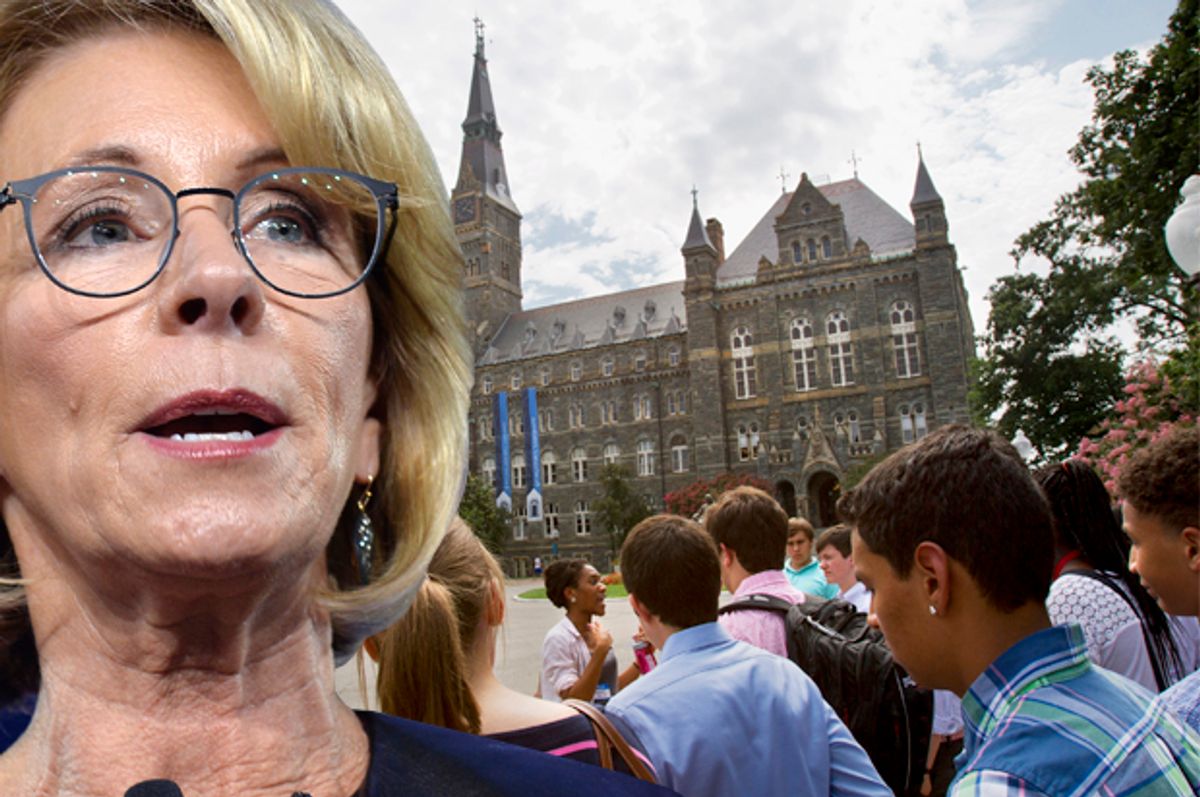Since taking the helm at the Education Department earlier this year, heiress and charter school advocate Betsy DeVos has been chipping away at student protection rules enacted by the Obama administration. Now, eighteen states and the District of Columbia have filed suit against Donald Trump’s secretary of education over her efforts to delay regulations meant to protect federal student loan borrowers from predatory practices by colleges.
The states’ complaint, filed in U.S. District Court on Thursday, accuses the Education Department of violating federal law by rescinding rules that sought to protect students defrauded by their schools. The rules, known as borrower defense, were revised in October and a finalized version was scheduled to take effect on July 1. On June 14, however, DeVos announced the delay and renegotiation of the key Obama-era consumer regulations aimed at reining in abuses by for-profit colleges.
Dating back to the 1990s, the rules allow students whose colleges used illegal or deceptive practices to entice them into loans to wipe away their federal debt. Following years of negotiation and review, the Obama administration simplified the claims process and shifted more of the cost of discharging loans off of students and onto schools. Nearly 16,000 borrower defense claims are currently being processed, the Education Department said last month.
Calling her decision to rescind the rule a "regulatory reset" and citing a legal challenge by a California association representing for-profit colleges, Devos argued that the Obama administration’s changes to help students actually created "a muddled process that's unfair to students and schools, and puts taxpayers on the hook for significant costs.”
But in their suit, the states say they have already pursued "numerous costly and time-intensive investigations and enforcement actions against proprietary and for-profit schools" that violated consumer protection laws. As the states' complaint notes, "taxpayers invested $32 billion in for-profit schools in the 2009-10 academic year, more than the annual budget of the U.S. Department of Justice and the U.S. Department of State during that time period."
In a statement accompanying the lawsuit, Massachusetts Attorney General Maura Healey wrote, “Since day one, Secretary DeVos has sided with for-profit school executives against students and families drowning in unaffordable student loans.” Healey, who led the multi-state coalition, continued: “Her decision to cancel vital protections for students and taxpayers is a betrayal of her office’s responsibility and a violation of federal law.”
As Politico reported in June, citing internal documents that it had obtained, DeVos cited the lawsuit from the California for-profit college as grounds to delay the rule’s implementation only after considering other rationales.
“[B]oth the language of the Delay Notice and the circumstances of its announcement belie this rationale and make clear that the Department’s reference to the pending litigation is a mere pretext for repealing the Rule and replacing it with a new rule that will remove or dilute,” the states alleged in their suit.
The states also argued in their complaint that Devos made a unilateral decision to rescind the protection for borrowers without soliciting or receiving input from stakeholders or the public. When she announced her decision last month, Devos said the Department of Education would convene new public hearings on the rule -- blasting her predecessor, John King, for "miss[ing] an opportunity to get it right." In announcing the rule delay, DeVos said she was trying to provide “clear, fair and balanced rules.”
The New York Times also reported that two student borrowers sued the Education Department in the same federal court on Thursday over the delayed rules.

Shares